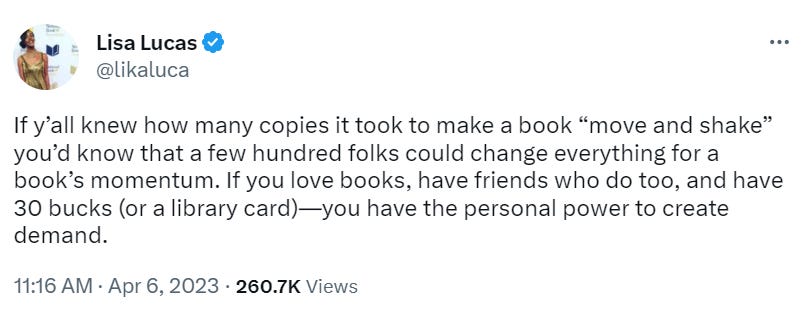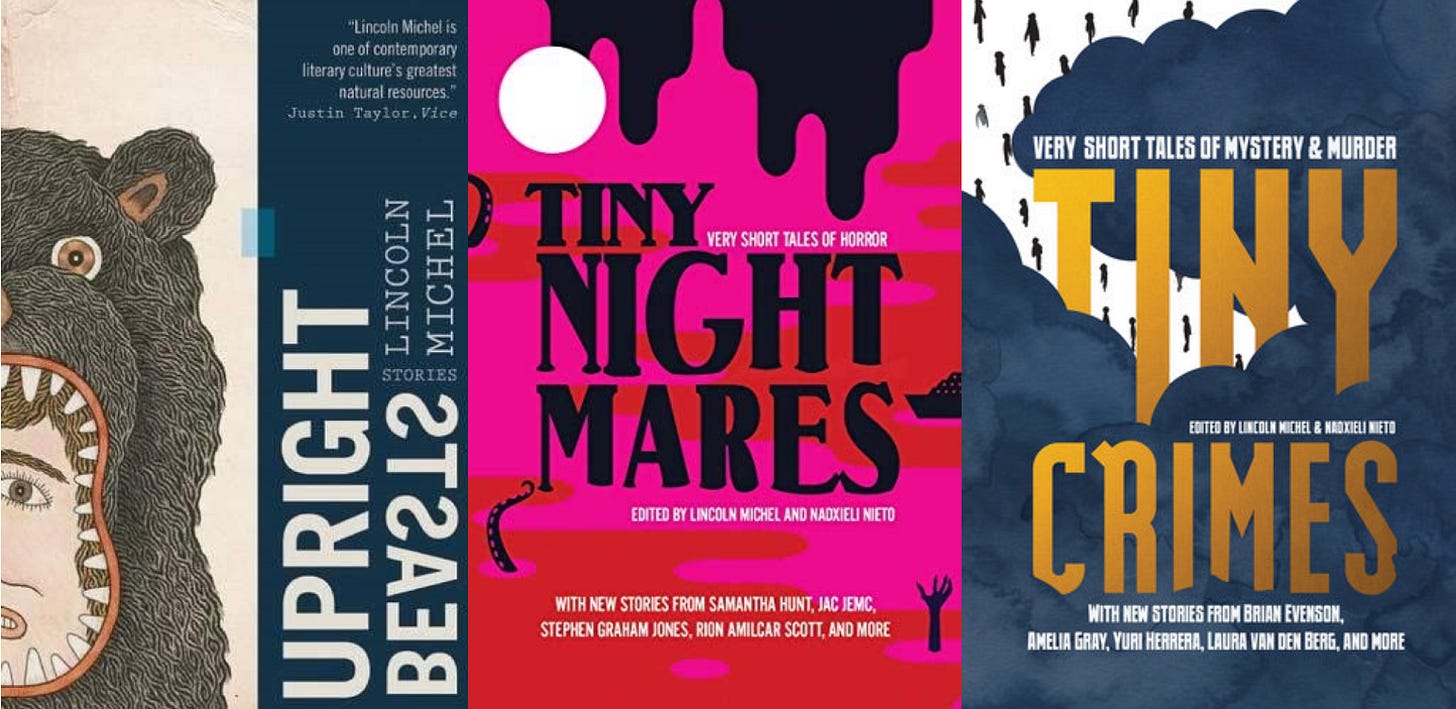Publishing Numbers Big and Small
On review copies as "theft" and making ripples for books you love
Often, I think the numbers explain everything in publishing. So many of the issues writers (understandably) complain about—long submission times, low advances, the difficulty of getting reviews, unresponsive agents, etc.—are explained in large part by the numbers. In short: there’s a massive amount of hopeful writers for every slot. This is true at every stage of publishing from submitting to lit mags and applying to residencies to winning awards and major fellowships.
This unbalanced ratio is depressing, yes, but I’ve always found it quite useful to understand for one’s mental health. It sucks when you submit a story to a lit mag to know there are hundreds of even thousands of other submissions competing for the same handful of spaces but knowing the odds are long makes it easier to not take rejection personally. And to know that a story can get rejected countless times and still be published in a great journal.
There were two recent tweets that made me think about the numbers in publishing this weekend, one stupid and one smart. The dumb tweet—which I won’t even bother linking to—was from an author loudly declaring that “accepting an ARC” (aka a review copy) without ever publishing a review is “theft.”
The other, smart tweet was from SVP and Publisher of Pantheon and Schocken Books, Lisa Lucas:
Lucas is completely correct, and displaying some of the silver linings of the numbers in publishing. Yes, there aren’t as many readers as we like and sales aren’t as high as we’d all want. But it also means that you, the individual reader, can make a real impact by promoting books you love.
Let me circle back to the idea that it is “theft” to not review a book if you’re given a review copy and talk about the numbers in book reviewing. One thing a lot of authors don’t realize is how many books reviewers get. When I was the editor Electric Literature’s website, we would get maybe a dozen books a day sent to the office. We only published two reviews a week. Bad odds. And even worse, because most of the reviews we published were pitched to us by writers so weren’t necessarily drawn from the big pile of review copies. This is how it works at most magazines. A place like the New Yorker is swimming in galleys with (I’ve heard) a half dozen ore more copies of many titles being sent to the offices. These are the odds a book is facing.
These days, I’m not an editor and only an occasional reviewer. I review for venues like The New York Times now and then and on this Substack infrequently. I maybe review (or interview the author of) 4-5 books for big venues, and then I interview authors or review books in this Substack a couple times a year. And I still get several books a week sent my way and an almost endless amount pitched to me over email. At least 20 emails a week. Of the books I do review for outlets like BOMB or the New York Times, typically they are assigned to me.
So the first lesson here is it’s of course impossible for reviewers to review every single book they’re sent. We can’t even read them all. I read about 100 books a year, but most of those are older books, books I’m rereading to teach, and so on. I max out at maybe 20 new books a year and at least half of those are writers I know and couldn’t ethically review.
This doesn’t mean books sent to me are pointless. I do read some of them and promote them if I love them. Most of the authors I’ve interviewed for Counter Craft like Martin Riker, Vauhini Vara, and Calvin Kasulke were writers I’d never heard of before. Their books just ended up in my ARC pile and I happened to pick them and love the work.
Now, certainly there’s a lot of waste in how publishing does arcs. I get a lot of books sent to me that are nowhere near the kind of work I’d like. I’m just on a publicity list somewhere I guess. But the reason that publicists send out so many copies relates to Lucas’s tweet. The flipside of all these depressing numbers are that a handful of people really can make a difference in a book’s trajectory.
One of the publishing numbers that truly surprised me was seeing how few book sales a book needs to get on the NYT bestseller list. Don’t get me wrong, it’s a huge achievement to get on the NYT bestseller list and I’ve certainly never done it. And to get anywhere near the top of the list, you need to be selling quite a lot.
But it probably takes fewer books than you think to hit the bottom of the list. Spots 14 or 15 say. The exact number varies season by season (and indeed week by week), but it can be around 4,000 copies or less in some weeks to hit the bottom spots. Even if you aren’t hitting the bestseller list, it doesn’t take that many sales to rocket you up the Amazon rankings or get “buzz” snowballing around the book world.
As Lucas said, a few hundred people boosting a book they admire can do a whole lot to shake up a books entire trajectory. And that doesn’t just mean reviewing. If we’re keeping it real, most traditional book reviews don’t get that many reads. Often it would be far better to have someone with a big social media account simply tweet or instagram about your book than to have them traditionally review it.
So while reviewing a book is never an obligation and not reviewing one certainly isn’t “theft,” the smallness of the publishing pond means an individual can really make a ripple.
And if failing to review books ever does become a crime, well, catch me on the lam from Johnny Law with a tote bag of galleys on my arm…
If you like this newsletter, consider subscribing or checking out my recent science fiction novel The Body Scout that The New York Times called “Timeless and original…a wild ride, sad and funny, surreal and intelligent.”
Other works I’ve written or co-edited include Upright Beasts (my story collection), Tiny Nightmares (an anthology of horror fiction), and Tiny Crimes (an anthology of crime fiction).






I worked at The New York Times, and the Book Review would get hundreds of unsolicited books. There were bins of them, many quite good, and just to get some elbow room the Book Review would send piles around to other departments if they weren't slated for a review. Great picking for reading at lunch, but I did feel sorry for the authors, who never knew that this was the ignominious end to their pearls of wisdom.
I’m starting to believe that getting reviewed on Substack where my following is growing is THE best way to boost KDP sales of my next book.